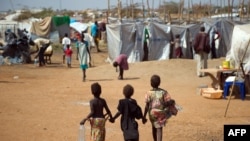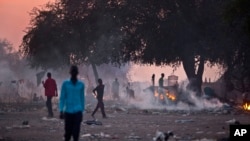The head of the U.N. Mission in South Sudan (UNMISS) joined international aid organizations and groups working with refugees Friday to hail the hours-old ceasefire agreement for South Sudan, voicing hope that it would hold and give the people of the young country "the peace they deserve."
Hilde Johnson, head of UNMISS, which, since the start of the unrest nearly six weeks ago, has provided shelter on its bases and compounds for some 70,000 people who fled fighting in South Sudan, called the ceasefire agreement signed Thursday in Addis Ababa "a first step towards lasting and durable peace in South Sudan."
She called on the parties to the conflict to "fully and immediately implement the agreement", which was due to come into force Friday, 24 hours after it was signed.
Johnson also called for an "inclusive and comprehensive political dialogue to resolve the underlying causes of the conflict, work towards national reconciliation and build effective state institutions so the people of South Sudan enjoy the peace they so much deserve."
A spokesman for the U.N. refugee agency, UNHCR, also welcomed the ceasefire agreement but said it did not spell the end of the crisis in the young country.
Spokesman Adrian Edwards voiced hope that the ceasefire "will be implemented to avert further displacement within and outside of the country," noting that hundreds of South Sudanese continue to flee to neighboring countries every day.
Since fighting broke out in Juba on Dec. 15 and rapidly spread around the country, more than 100,000 South Sudanese have fled to Uganda, Ethiopia, Kenya and Sudan, while some 490,000 people are internally displaced in South Sudan, the UNHCR said.
Recent arrivals in neighboring Uganda, which has taken in the largest number of refugees from South Sudan, "are visibly weaker and coming with much less luggage, suggesting they are coming from more distant areas of South Sudan," Edwards told reporters in Geneva.
"We continue to hear reports from inside South Sudan of people readying to cross into Uganda, depending on the situation," he added.
International development organization Oxfam hailed the ceasefire as "a sign of political progress" in the conflict that in nearly six weeks has claimed thousands of lives.
But, warned Oxfam, efforts to support the more than 50,000 South Sudanese refugees in Uganda are "grossly under-resourced, and host communities are being pushed to the breaking point."
"In Northern Uganda’s Arua and Adjumani districts, more than 1,000 South Sudanese refugees—mostly women and children—arrive every day," the organization said.
Aid workers on the ground in Uganda have reported shortages of clean drinking water, health facilities and basic sanitation, Oxfam said.
"These gaps must quickly be filled in order to stem a growing public health risk to both the refugee community and the Ugandan villages that are hosting them," it said in a statement.
The U.N. World Food Programme (WFP) said it planned to "seize any window of opportunity to deliver food assistance to areas that have been difficult to reach" in South Sudan.
“We hope that the signing of an agreement in Addis will bring fighting to a stop and allow WFP and other humanitarian agencies to provide urgently needed relief to the people affected by this conflict,” said WFP Country Director Chris Nikoi.
“But it is important to note that humanitarian needs will continue, long after the fighting stops.”
The WFP has only been able to assist around a third of the nearly 600,000 people displaced by the conflict in South Sudan.
WFP said in a statement that it fears "the conflict has done so much damage that many people will continue to need food assistance for months – or longer – as they attempt to rebuild their lives."
"Many homes, food markets and small businesses have been destroyed, and many people have lost their annual harvest, leaving them with nothing at a time of year when they struggle to feed their families," it said.
Hilde Johnson, head of UNMISS, which, since the start of the unrest nearly six weeks ago, has provided shelter on its bases and compounds for some 70,000 people who fled fighting in South Sudan, called the ceasefire agreement signed Thursday in Addis Ababa "a first step towards lasting and durable peace in South Sudan."
She called on the parties to the conflict to "fully and immediately implement the agreement", which was due to come into force Friday, 24 hours after it was signed.
Johnson also called for an "inclusive and comprehensive political dialogue to resolve the underlying causes of the conflict, work towards national reconciliation and build effective state institutions so the people of South Sudan enjoy the peace they so much deserve."
A spokesman for the U.N. refugee agency, UNHCR, also welcomed the ceasefire agreement but said it did not spell the end of the crisis in the young country.
Spokesman Adrian Edwards voiced hope that the ceasefire "will be implemented to avert further displacement within and outside of the country," noting that hundreds of South Sudanese continue to flee to neighboring countries every day.
Since fighting broke out in Juba on Dec. 15 and rapidly spread around the country, more than 100,000 South Sudanese have fled to Uganda, Ethiopia, Kenya and Sudan, while some 490,000 people are internally displaced in South Sudan, the UNHCR said.
Recent arrivals in neighboring Uganda, which has taken in the largest number of refugees from South Sudan, "are visibly weaker and coming with much less luggage, suggesting they are coming from more distant areas of South Sudan," Edwards told reporters in Geneva.
"We continue to hear reports from inside South Sudan of people readying to cross into Uganda, depending on the situation," he added.
International development organization Oxfam hailed the ceasefire as "a sign of political progress" in the conflict that in nearly six weeks has claimed thousands of lives.
But, warned Oxfam, efforts to support the more than 50,000 South Sudanese refugees in Uganda are "grossly under-resourced, and host communities are being pushed to the breaking point."
"In Northern Uganda’s Arua and Adjumani districts, more than 1,000 South Sudanese refugees—mostly women and children—arrive every day," the organization said.
Aid workers on the ground in Uganda have reported shortages of clean drinking water, health facilities and basic sanitation, Oxfam said.
"These gaps must quickly be filled in order to stem a growing public health risk to both the refugee community and the Ugandan villages that are hosting them," it said in a statement.
The U.N. World Food Programme (WFP) said it planned to "seize any window of opportunity to deliver food assistance to areas that have been difficult to reach" in South Sudan.
Humanitarian needs will continue, long after the fighting stops.”Chris Nikoi, World Food Programme Country Director for South Sudan
“But it is important to note that humanitarian needs will continue, long after the fighting stops.”
The WFP has only been able to assist around a third of the nearly 600,000 people displaced by the conflict in South Sudan.
WFP said in a statement that it fears "the conflict has done so much damage that many people will continue to need food assistance for months – or longer – as they attempt to rebuild their lives."
"Many homes, food markets and small businesses have been destroyed, and many people have lost their annual harvest, leaving them with nothing at a time of year when they struggle to feed their families," it said.






